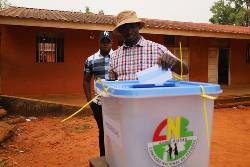BISSAU, Guinea-Bissau (AP) — Counting of votes is underway in Guinea-Bissau where voting for presidential and legislative seats took place on Sunday for President Umaro Sissoco Embaló who is seeking a second term in the nation that has endured multiple coups.
The elections have come at a critical time in West Africa, where democracy has recently been challenged by disputed elections that analysts say could embolden militaries that have forcefully taken power in several countries.
Analysts say the vote was a close race between Embaló and Fernando Dias da Costa, a little-known 47-year-old backed by former Prime Minister Domingos Simões Pereira, the runner-up in the 2019 presidential election. The winner needs more than 50% of the votes; otherwise, the election will head to a runoff.
The incumbent president, who cast his vote in Gabu, a city located 200 kilometers (124 miles) from the capital, Bissau, urged people to come out and vote. “I am the one who will serve a second term, and I hope that the electoral process will take place calmly and peacefully,” Embaló said.
Dias da Costa said his party would not tolerate arrest and suppression of his supporters, accusing Embaló of high-handed tactics, after voting today.
Embaló, a 53-year-old former army general who first came to power in 2021, is backed by a political coalition of more than 20 groups. He is being challenged by 11 other candidates.
Pereira and the main opposition African Party for the Independence of Guinea and Cape Verde, which he leads, were barred from Sunday's election after authorities said they failed to submit their application early.
Nearly half the country’s population of 2.2 million citizens are registered to vote.
It is seen as one of the most contentious votes in recent history because of the exclusion of the main opposition party.
“The democracy we knew ... is no longer the model we are experiencing; we are experiencing a model defined by a single person,” said political analyst Augusto Nansambe.
Guinea-Bissau is one of the world’s poorest countries, with half its population considered poor, according to the World Bank. It has emerged as a hub for drug trafficking between Latin America and Europe, and has been dogged by coups and attempted coups since its independence from Portugal more than 50 years ago.
Uncertainty clouds the election
The vote comes at a critical time for the African country, which has endured multiple coups, with an attempt reported in October. Embaló has also faced a legitimacy crisis with the opposition saying his tenure had long expired and that they do not recognize him as president.
The Guinea-Bissau leader won an election in November 2019, and was sworn in as president in February 2020, but the opposition contested the result and the Supreme Court did not recognize his victory until Sept. 4. The opposition says Embaló’s term should have ended on Feb. 27 of this year, but the Supreme Court ruled it should run until Sept. 4. The vote, however was delayed until November.
The legislative election is also being held in unusual circumstances. The opposition-dominated parliament has not convened since December 2023, when it was dissolved by Embaló after an attempted coup. The main opposition party won the legislative election in 2023 and in 2019.
“Aside from questions of who emerges victorious, the ongoing electoral story in Guinea-Bissau will be about how to build and sustain momentum for a stable system of government and institutional guardrails against the abuse of executive power,” the Africa Center for Strategic Studies said in its review.
Embaló pitches infrastructure while challenger promises stability
The election campaign was marked by accusations of hate speech, murder and corruption from the different candidates — a trend that could throw the country into crisis, according to Denise dos Santos Indeque, coordinator of the West Africa Network for Peacebuilding in Guinea-Bissau.
Embaló hinged his campaign on infrastructural development, including road construction and the modernization of the country's main airport.
Dias, on the other hand, promised to promote stability, freedoms and security. He accused Embaló's government of “systematic” human rights violations, urging people to “vote for change, for national unity, for reconciliation, for peace, and for an end to the authoritarian regime in Guinea-Bissau.”
In the capital of Bissau, resident Marinho Insoldé expressed optimism the election outcome would improve conditions.
“I hope that these elections will bring peace and tranquility so that there is no more hunger,” said Insoldé.
——
Asadu reported from Dakar, Senegal and Adetayo reported from Lagos, Nigeria. Associated Press journalist Caitlin Kelly in Dakar contributed.
...


